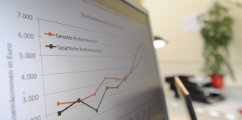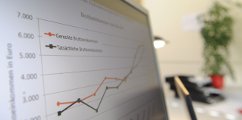Project A6
- Hülle, Sebastian
- Wiss. Mit. Teilprojekt A6
- Liebig, Stefan, Prof. Dr.
- Head of Project A6
- May, Meike
- Research associate Project A6
- Sauer, Carsten, Dr.
- Research associate Project A6
- Valet, Peter
- Research associate Project A6
This project investigates (a) the conditions under which inequalities are perceived as problems of justice and (b) how embedment in different social contexts influences the formation of attitudes to justice across the life course.
We assume that individuals evaluate inequalities in terms of whether they consider them just, and that they hold particular attitudes toward justice because, and as long as, these help them to attain their fundamental goals and to solve, especially, the problems that arise through cooperation with other people (cooperative relations). As a result, attitudes on justice are not viewed either as rigidly stable orientations across the life span or as “Sunday best beliefs” i.e. short-lived opinions that are adjusted continuously to fit situational interests. Instead, they are regarded as being shaped by the opportunities for learning and making comparisons in different phases of the life course and different social contexts.
The goal of the project is to use longitudinal survey data to explain why individuals have particular notions of justice. The key aspect is taken to be changes in the social context—particularly households, social networks, or workplaces—in which individuals are embedded across their life course. This is because social contexts offer opportunities to make social comparisons and engage in social learning, processes that are decisive in the formation of particular attitudes to justice. The project will test this empirically by setting up a special longitudinal panel in which the same individuals will be interviewed three times over an 11-year period.
The results of the project will permit conclusions to be drawn on the consequences of changes in a society's social and economic structure for its members' ideas about justice. The project therefore supplements the analysis of the mechanisms that produce inequality, which is the focus of SFB 882 as a whole, by looking at subjective evaluations, and it complements that focus by addressing the mechanisms of attitude formation.
Research goals
(1) Analysis of the conditions in which justice is used as a criterion for evaluating inequalities.
(2) Explanation of attitudes toward justice as the outcome of comparison and learning processes mediated by the social context.
(3) Longitudinal observation of the individual development of attitudes to justice over the life course.
Research design
(1) Continuation and expansion of the longitudinal survey of evaluations of justice conducted by the German Socio-Economic Panel Study (SOEP).
(2) Commencement of an independent longitudinal panel with ties to the process-generated individual data of the German Institute for Employment Research (IAB) and information on companies and households (the plan is to carry out three survey waves over an 11-year period).
61 Publications
Liebig S, Hülle S, May M (2016) SOEPpapers on Multidisciplinary Panel Data Research at DIW Berlin; 831.
Berlin: DIW.
Liebig S, Sauer C (2016)
In: Handbook of Social Justice Theory and Research Part I. Sabbagh C, Schmitt M (Eds); New York: Springer Science + Business Media: 37-59.
Schunck R, Sauer C, Valet P (2015)
European Sociological Review 31(6): 655-666.
Liebig S, Sauer C, Friedhoff S (2015)
Soziale Welt 22(Sonderband): 316-334.
Liebig S, Sauer C, Friedhoff S (2015) SFB 882 Working Paper Series; 47.
Bielefeld: DFG Research Center (SFB) 882 From Heterogeneities to Inequalities.
Liebig S, May M, Sauer C, Schneider S, Valet P (2015)
Methods, data, analyses 9(1): 57-86.
Schneider S, Shamon H (2015) SFB 882 Working Paper Series; 44.
Bielefeld: DFG Research Center (SFB) 882 From Heterogeneities to Inequalities.
Pfinder M (2015) SFB 882 Working Paper Series; 52.
Bielefeld: DFG Research Center (SFB) 882 From Heterogeneities to Inequalities.
Liebig S, May M (2015) SFB 882 Working Paper Series; 48.
Bielefeld: DFG Research Center (SFB) 882 From Heterogeneities to Inequalities.
Kruphölter S, Sauer C, Valet P (2015) SFB 882 Working Paper Series; 45.
Bielefeld: DFG Research Center (SFB) 882 From Heterogeneities to Inequalities.
Liebig S, Sauer C, Hülle S (2015) SFB 882 Working Paper Series; 46.
Bielefeld: DFG Research Center (SFB) 882 From Heterogeneities to Inequalities.
Liebig S (2015)
In: Gerechtigkeit ist möglich - Worauf es in Deutschland und der Welt ankommt. Rutz M (Ed); Freiburg, Basel, Wien: Herder: 116-133.
Auspurg K, Hinz T, Liebig S, Sauer C (2015)
In: Improving Survey Methods. Lessons from recent Research. Engel U, Jann B, Lynn P, Scherpenzeel A, Sturgis P (Eds); New York: Routledge: 137-149.
Sauer C (2014)
Stata Journal 14(1): 226-229.
Liebig S, Hülle S, Schupp J (2014)
DIW Economic Bulletin 2014(11): 59-64.
Liebig S, May M, Sauer C, Schneider S, Valet P (2014) SFB 882 Working Paper Series; 35.
Bielefeld: DFG Research Center (SFB) 882 From Heterogeneities to Inequalities.
Sattler S, Mehlkop G, Graeff P, Sauer C (2014)
Substance Abuse Treatment, Prevention, and Policy 9(1).
Valet P, May M, Sauer C, Liebig S (2014) SFB 882 Technical Report Series; 13.
Bielefeld: DFG Research Center (SFB) 882 From Heterogeneities to Inequalities.
Sauer C, Valet P, Liebig S (2014) SFB 882 Working Paper Series; 33.
Bielefeld: DFG Research Center (SFB) 882 From Heterogeneities to Inequalities.
Baumert A, Beierlein C, Schmitt M, Kemper CJ, Kovaleva A, Liebig S, Rammstedt B (2014)
Journal of Personality Assessment 96(3): 380-390.
Liebig S, Hülle S, Schupp J (2014)
DIW-Wochenbericht 81(40): 995-1000.
Sauer C, Valet P, Meyer L (2014) SFB 882 Technical Report Series; 11.
Bielefeld: DFG Research Center (SFB) 882 From Heterogeneities to Inequalities.
Sauer C (2014) SFB 882 Working Paper Series; 29.
Bielefeld: DFG Research Center (SFB) 882 From Heterogeneities to Inequalities.
Sauer C, Valet P (2014) SFB 882 Technical Report Series; 10.
Bielefeld: DFG Research Center (SFB) 882 From Heterogeneities to Inequalities.
Pfinder M, Liebig S, Feldmann R (2014)
Zeitschrift für Entwicklungspsychologie und Pädagogische Psychologie 46(2): 89-100.
Sauer C, Auspurg K, Hinz T, Liebig S, Schupp J (2014) SOEPpapers; 629.
Berlin: DIW.
Schunck R, Sauer C, Valet P (2013)
WSI Mitteilungen 66(8): 553-561.
Liebig S, Sauer C (2013)
Analyse & Kritik. Zeitschrift für Sozialtheorie 35(2): 371-394.
May M, Schwanholz J (2013)
Zeitschrift für Sozialreform 59(2): 197-225.
Sauer C, Valet P (2013)
Social Justice Research 26(2): 132-150.
Sauer C, Valet P, Liebig S (2013) SFB 882 Working Paper Series; 21.
Bielefeld: DFG Research Center (SFB) 882 From Heterogeneities to Inequalities.
Schneider S, Valet P (2013) SFB 882 Working Paper Series; 22.
Bielefeld: DFG Research Center (SFB) 882 From Heterogeneities to Inequalities.
Müller-Engelmann M, Donner-Banzhoff N, Keller H, Rosinger L, Sauer C, Rehfeldt K, Krones T (2013)
Medical Decision Making 33(1): 37-47.
Liebig S, Sauer C, Valet P (2013)
In: Handwörterbuch zur Gesellschaft Deutschlands. Mau S, Schöneck NM (Eds); Springer VS: 286-299.
Schneider S, Schupp J (In Press)
Social Indicators Research 115(2): 767-789.
Liebig S, May M, Sauer C, Schneider S, Valet P (2012) SFB 882 Working Paper Series; 10.
Bielefeld: DFG Research Center (SFB) 882 From Heterogeneities to Inequalities.
Schneider S (2012)
Social Indicators Research 106(3): 419-438.
Schneider S (2012)
: 463-466.
Liebig S (2012)
In: Marktwirtschaft und soziale Gerechtigkeit. Vanberg VJ (Ed); Tübingen: Mohr Siebeck: 275-295.
Liebig S, Sauer C, Schupp J (2012)
Research in Social Stratification and Mobility 30(2): 219-232.
Schneider S, Schupp J (2011)
SOEPpapers on Multidisciplinary Panel Data Research (360).
Liebig S, Sauer C, Schupp J (2011)
KZfSS Kölner Zeitschrift für Soziologie und Sozialpsychologie 63(1): 33-59.
Sauer C, Auspurg K, Hinz T, Liebig S (2011)
Survey Research Methods 5(3): 89-102.
Liebig S (2011)
Wirtschaftspolitische Blätter 58(2): 199-212.
Liebig S, Valet P, Schupp J (2010)
DIW-Wochenbericht (27-28): 11-16.
Fetchenhauer D, Goldschmidt N, Hradil S, Liebig S (Eds) (2010)
München: Roman Herzog Institut .
Liebig S, Sauer C, Schupp J (2010) SOEPpapers; SOEPpapers 309.
DIW Berlin.
Schneider S, Schupp J (2010)
DIW-Data Documentation (48).
Schneider S (2010)
SOEPpapers on Multidisciplinary Panel Data Research (333).
Auspurg K, Hinz T, Liebig S, Sauer C (2010)
In: Unsichere Zeiten. Kongressband zum 34. DGS Kongress der Deutschen Gesellschaft für Soziologie in Jena 2008. Soeffner H-G (Ed); Wiesbaden: VS Verlag für Sozialwissenschaften.
Liebig S, Valet P, Schupp J (2010) Weekly Report.
DIW Berlin, German Institute for Economic Research.
Wegener B, Liebig S (2010)
In: Leben in Ost- und Westdeutschland: Eine sozialwissenschaftliche Bilanz der deutschen Einheit. Krause P, Ostner I (Eds); Frankfurt/M.: Campus: 83-102.
Auspurg K, Hinz T, Liebig S, Sauer C (2009)
soFid Methoden und Instrumente der Sozialwissenschaften 2009(2): 23-39.
Liebig S (2009)
Praxis Politik 5(1): 4-8.
Hinz T, Auspurg K, Liebig S (2009)
MDA – Methoden, Daten, Analysen 3(1): 59-96.
Liebig S, May M (2009)
Aus Politik und Zeitgeschichte 59(47): 3-8.
Liebig S, Sauer C, Schupp J (2009) SOEPpapers.
Berlin: DIW.
Liebig S, Sauer C, Auspurg K, Hinz T, Schupp J, Donaubauer A (2009) IZA Discussion Paper; 4663.
Bonn: IZA.
Sauer C, Auspurg K, Hinz T, Liebig S, Schupp J (2009) SOEPpapers; SOEPpapers, 189.
Berlin: DIW.
Georg W, Sauer C, Wöhler T (2009)
In: Klein aber fein! Quantitative empirische Sozialforschung mit kleinen Fallzahlen. Kriwy P, Gross C (Eds); Wiesbaden: VS Verlag für Sozialwissenschaften: 349-372.












